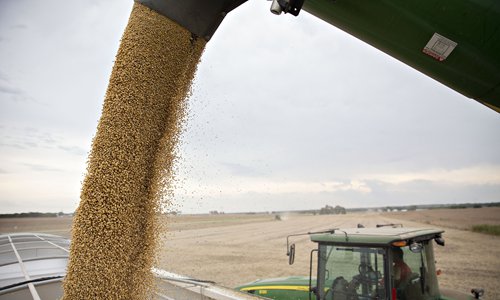HOME >> SOURCE
US soybean exports to China at risk amid COVID-19 outbreak despite demand remains: analyst
By Yin Yeping and Wang Cong Source:Globaltimes.cn Published: 2020/3/23 1:55:13

Soybeans are loaded into a grain cart during harvest in the US state of Illinois in 2018. File Photo: VCG
The coronavirus (COVID-19) epidemic in the US could deliver a major blow to US soybean exports to China, forcing a reduction in volume despite continued demand in China, analysts recently said.
The warning comes as US soybean farmers set their sights on China demand following a phase one trade agreement as planting approaches and the agriculture industry grapples with inventory overload due to the trade war with China.
"We are closely monitoring ongoing developments surrounding the coronavirus and assessing all potential impacts on [US] soy demand in China. For now, we have seen limited disruption," Jim Sutter, CEO of US Soybean Export Council, told the Global Times on Sunday.
Sutter said that US soybean exports to China are slower during this time of the year as farmers are in the middle of planting season but "as we near our harvest and shipping window in the fall, US farmers are optimistic that China will honor the Phase One trade agreement to increase imports of US farm products, including soybeans."
As part of the trade deal reached in January, China committed to increase purchases of US products by $200 billion over the next two years, including $32 billion in agriculture goods. Soybean purchases are believed to be a big part of that, though a specific amount remains unknown.
Although COVID-19 disrupted business operations in China, the demand for US soybeans has not changed, according to Sang Baichuan, director of the Institute of International Business at the University of International Business and Economics in Beijing and Chinese government trade advisor.
"The structure of the Chinese economy remains largely unchanged, so the real demand for soybean also remains largely unchanged," Sang told the Global Times on Sunday.
However, specific transactions could be interrupted because of the disruptions to economic activities, trade and personnel exchange, and "there might be some gap between real volume [for soybean trade] and the demand," Sang said, adding that China remains committed to the deal, but the US needs to rein in the epidemic to pave the way for trade activities.
Despite shifting signals from the US, Chinese officials have rolled out with concrete measures to implement the phase one deal, which includes purchasing US soybeans. And Chinese officials recently waived tariffs on US agriculture products such as soybeans. Media reports have revealed the tariff exemptions will cover 10 million tons of US soybeans.
Major disruptions in soybean trade could create added pressure on US farmers, who, according to Sutter, are grappling with a record high inventory as a result of the trade war.
"Each growing season is different, and every year comes with its own challenges. Farmers dealt with a number of challenges last season, including flooding, wet weather, and an unpredictable market. This public health issue adds to global uncertainty. However, our farmers are resilient, and we believe global demand for US soy remains strong," Sutter said.
Posted in: INDUSTRIES